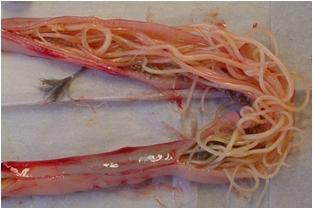I just found this information after hours of research via the internet. I thought you all might find it helpful. At the end is some recommended medicines and dosages.
Intestinal parasites (worms) are very common in chickens in the backyard type poultry flocks. The presence of a few parasites do not usually cause a problem. However, large numbers can have a devastating effect on growth, egg production, and over-all health. The concentration of parasite eggs in the chickens environment is one factor which plays a major role in determining the severity of the infection. The chickens pick up the parasite eggs directly by ingesting contaminated feed, water, or litter or by eating snails, earthworms, or other insects (intermediate hosts) which can carry the eggs.
Clinical signs of parasitism are unthriftyness, poor growth and feed conversion, decreased egg production, and even death in severe infections. Furthermore, parasites can make the flock less resistant to diseases and exacerbate existing disease conditions.
Of all the intestinal worms, large roundworms (Ascaridia galli) probably inflict the most darnage. Young birds are affected more severely. A mild infection is often not noticed. Large numbers of worms, however, interfere with feed absorption causing poor growth and production. In severe infections there can be actual intestinal blockage by the worms, causing death. Affected birds are unthrifty and more susceptible to other diseases. Roundworms are passed from bird to bird by directly ingesting the parasite egg in fecal contaminated feed, water, or litter, or by eating grasshoppers or earthworms carrying the parasite.
Another worm commonly found in chickens is the cecal worm (Heterakis gallinarum). While it rarely causes problems in chickens, its chief economic importance lies in its role as a carrier of the organism Histomonas melegridis, which causes a deadly disease in turkeys known as blackhead. Earthworms ingest the cecal worm egg containing the histomonad organism from the chicken litter. When the earthworms are ingested by the turkeys, they become infected. The cecal worm egg containing the histomonad organism may also be directly ingested by turkeys. Thus, one should never house chickens and turkeys together or allow turkeys on range which chickens have previously occupied.
Other intestinal parasites that cause problems are the small roundworms (Capillaria sp.). These parasites infect the intestines causing hemorrhage and thickening of the intestinal walls, leading to poor feed absorption and poor growth. Small roundworms are passed directly from bird to bird by ingestion of the parasite eggs or by ingestion of earthworms, insects, and other vectors carrying the parasite. Tapeworms are also very common, but unlike other worms must be passed through an intermediate host, such as a snail, slug, earthworm, beetle or fly.
Prevention and control of worm infestations in backyard poultry flocks involves proper management of diet, sanitation, and treatment. Chickens need a proper diet, especially an adequate supply of vitamins A and the B complex. A deficiency in these has been shown to increase the susceptibility to parasitism.
1. Thorough removal of litter between flocks of chickens.
3. Keep litter as dry as possible.
5. Avoid overcrowding.
7. Keep wild birds, pigeons and other birds away from chickens. They may be infected and shedding the worm eggs.
9. Provide adequate drainage of ranges and move shelters frequently to decrease accumulation of droppings.
11. Keep birds off freshly plowed ground where ingestion of earthworms and other insects is more likely.
13. Use insecticides to control insect populations.
The treatment of chickens to control intestinal parasites can benefit the grower by decreasing parasite levels in heavily infected birds. This will result in a decrease in the build-up of parasite eggs in the environment. Specific worm infections require specific medications. A determination of which worms are affecting your chickens should be made by your veterinarian prior to treatment. Proper use of medication in combination with sound management and sanitation practices should limit production losses from intestinal worms.
In this list will be some of the types of wormer's that can be used.((((warning)))) please check the label for dosage on your product before use. dont go by what you see here double check the product thats being used for proper dosage. and thanks to Robin for helping me gather the list.
Ivomec Eprinex (pour on cattle wormer and anti-paracitical) 1/4 cc for bantams,
1/2 cc for large fowl. Place at base of neck against skin. Removes most
internal and external parasites. repeat in 10 days.
Valbazen (albendazole) mix 8 cc of water with 1 cc of wormer. Give 2 cc's to
each bird. Removed most internal parasites including tapes. repeat in ten
days.
Ivermectin (1% injectable) .10 cc injected in the muscle. Removes most round
worms, tapes and external parasites. repeat in ten days
Levamisole, fill container per instructions with water. Put 2 TBLS in 1 gal of
water. Most round worms and gapes. repeat in ten days.
Safeguard (fenbendazole) same mixing and administration as Levamisole. Removes
all but tapes. Repeat in ten days.
Piperazine,17 % product. 1 Tablespoon per gallon, Give for 1 Day. May be repeated if necessary in 10 days.
Piperazine,34 % product. 1 1/2 Teaspoons per Gallon, Give for 1 Day. May be repeated if necessary in 10 days.
removes roundworms (Ascaridia spp.) from turkeys, chickens, and roundworms (Ascaris summ)
pig swig (PIPERAZINE WATER WORMER) Fruit Flavor Keep out of reach of children. treatment for the removal of large roundworms (Ascaris lumbriocoides) and nodular worms (Oesophagostomum spp.) from swine, and roundworms (Ascaridis spp.) from poultry. Worms are usually expelled within one day after treatment. 1 Tablespoon per gallon, Give for 1 Day. May be repeated if necessary in 10 days.





